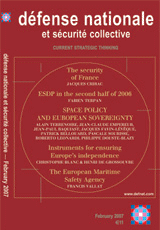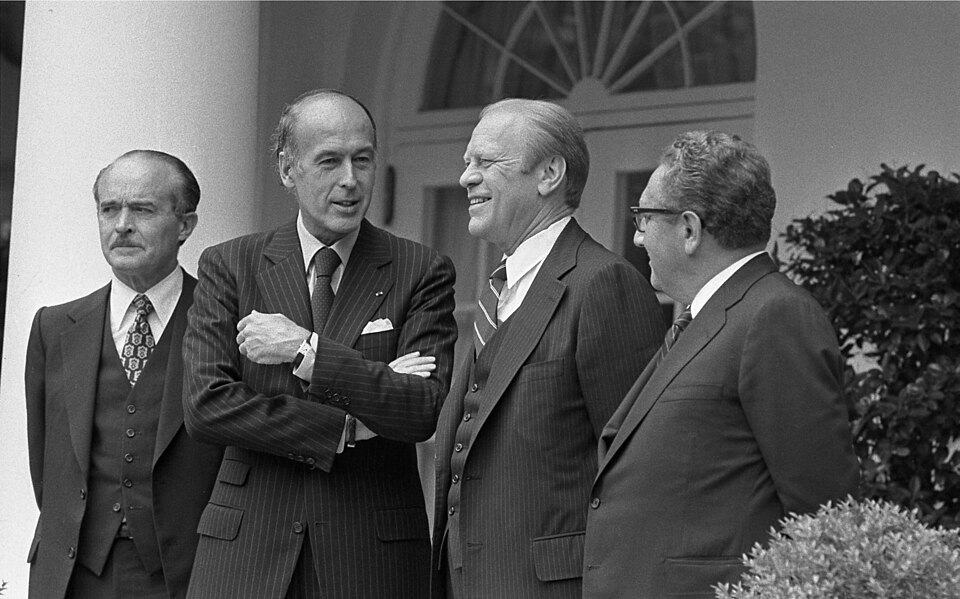Edition anglaise

March 2007 - n° 695
Europe and globalisation - Catherine Colonna
Since the signing of the Treaty of Rome, Europe has successfully structured itself: a Europe open to the world, a Europe which adapts, innovates, and defines new rules. This power that is Europe, with its unique experience of shared sovereignty, must become a global actor in globalisation.
The European Union and its 'baroque' future - Jacques Andréani
The vote against the Constitution is the sign of a lack of adjustment to today’s world and of a crisis of decision-making in all democratic countries. Has the European process reached the point of no return? Although a new start is far from assured, there is a ‘demand for Europe’, mainly in the fields where the European Union has so far been ineffective: making Europe’s voice heard in international crises, acting in favour of peace and development. On this path we will run into two difficulties: the consequences of enlargement and the inadequacy of institutional mechanisms. ‘Enhanced cooperation’ will allow us to go forward, while giving the European architecture a somewhat baroque appearance. This method is not applicable for foreign policy in which, for a long time, we shall have to make do with ad hoc measures and pretences, which will accentuate the baroque character of the system.
A fiftieth birthday and the quirks of history - Gabriel Robin
The fiftieth anniversary of the Treaty of Rome and, we are led to believe, that of Europe. On the Brussels scene, neither the back drop nor the costumes have changed, and the sign shining outside the theatre still spells the word ‘Europe’. One simply forgets that it is a different production that is being staged.
New challenges for the West, for Europe - Benoît Aboville (d')
‘Post-Iraq’ is not the least of the parameters which the EU and NATO are going to have to take into account in the coming years. But above all, the strategic situation is about to change profoundly with the emergence onto the international scene of new powers. A new transatlantic relationship necessarily means direct dialogue between the EU and the United States. At this stage it is far from perfect.
Europe defence: the determination of a position by triangulation - Jean-François Morel
In European time, security and defence policy is progressing despite a general slowing down. It is cutting a path between the uncertainty of the constitutional issues and growing international demands: very few problems arise without the question of what Europe can do to resolve them being asked. Answering it calls for in-depth changes which are being prepared today.
A renewed strategy for the twenty-first century - Christian Girard
Debates on defence, most often and unfortunately, turn into discussions about programmes and budgets. Yet it is on the basis of geopolitical analysis and political plans that foreign, security and defence policies must be defined. This article attempts to show that national strategy has to be revised in depth taking account of new geostrategic factors, the Atlantic Alliance and continuing European integration. Important changes and continuity are equally necessary.
Strategic globalisation and urban warfare - Georges-Henri Bricet des Vallons
From the fall of Baghdad (mobile operations) to the battle of Fallujah (swarming) or Basra (siege warfare) the war in Iraq has covered the full spectrum of urban operations, and confirms the opinion of many observers of the major threat which the pacification of urban areas poses to Western armies. Looking back on the growing friction between ‘transformation’ and ‘adaptation’, the author attempts here to explore the American doctrinal reinvention of urban warfare and its repercussions on the strategic conduct of urban stabilisation operations, especially by the comprehensive–termed interagency–integration of quasi-public non-governmental groups without access to regular forces.
Hyperpower and hyperterrorism: the master/slave dialectic - Céline Bryon-Portet
Nations with hegemonic ambitions proclaim their values as the absolute standard of reference and impose strategic paralysis by force, seemingly encouraging the creation of their mirror image. In this sense, hyperterrorism, which uses asymmetrical methods to get round the obstacles and rules laid down by the masters of the international game, is surely the illegitimate child of hyperpower. Read more
Irak after the death of Saddam Hussein - Thomas Richard
The execution of Saddam Hussein marks the end of an era and is a symbolic illustration of a new direction in Iraqi politics. Power-sharing and the place of Iran are difficult issues to grasp, and the customary comparisons with Vietnam and Germany are not always relevant in an open-ended situation between breakdown of the State and its reconstruction.
Muslim solidarity and Islamic finance - Gwennola Colléter
The intention here is not to describe precisely the complex scope of Islamic finance, but rather to give the reader a better understanding of the ins and outs of Islamic financial resources, and the reasons why it is particularly difficult to block its sources.
The fight against cultic deviance - Jean-Michel Roulet
Extracts from the 2006 report of the Interministerial Mission for Monitoring and Combating Cultic Deviance (Miviludes). The full text is available, in French, at www.miviludes.gouv.fr .
The Turkish Army: military power, civil power - Levent Ünsaldi
The Turkish Army is ever-present politically, less as an adviser and executive arm of the Government helping with the planning and execution of public decisions but more as an arbiter of influence placed at the very heart of the social order’s nervous system, to quote Durkheim. It is also an historic force, as the actor which generated the State and gave it substance; one is reminded of the celebrated phrase of von Seekt that the Reichswehr was ‘. . . not only at the service of the State–it is the State’. Finally, the cultural mission of providing a framework and training to the entire State is entrusted to its officers; the reality of this may be debated these days, but military rhetoric and imagination leave little doubt as to the theory. The whole question of the military in Turkey is strangely discreet in the social sciences. The main aim of this article is to examine the reality of military influence in Turkey, and to bring out its main aspects.
Croatia's moves toward the EU (1992-2007) - Philippe Boulanger
After briefly summarising the end of the Tudjman era, initial European procrastination and the ‘swing’ of the January 2000 elections, this article attempts to analyse the main issues on which Croatia’s entry into the European Union depends: the Serbian minority, privatisation, the arrest of war criminals, cooperation with the International Criminal Tribunal for the Former Yugoslavia (ICTY).
Widening the Panama Canal: what are the new issues? - Olivia Maleville (de)
On 22 October 2006 the Panamanians decided to approve a project to widen the canal. As the commercial choke point for the northern hemisphere, the Panama Canal is today at the cusp of two global macroeconomic phenomena: the evolution of sea routes and the transformation of geopolitical balances. The canal’s competitiveness is being put to the test in a context of growing worldwide maritime traffic. After it is widened it will continue to have an important place in world maritime trade. The strategic importance of the canal is thus different in kind to that which it enjoyed in the past: its military interest has given way to purely commercial considerations.
Sicial dialogue and freedom of expression for the Armed Forces - Jean-Michel Bernard
Le Conseil superieur de la function militaire (CSFM), a high-level council created in 1969 in response to the military community’s need for ‘dialogue’, or more exactly, for ‘consultation’, is working well. Neither a trade union nor a bureau for lodging complaints, it responds in a unique and often effective way to a real desire to make grievances heard. Misunderstood and criticised, it none the makes its presence felt, as its contribution to the provident fund affair has shown.
The centenary of the helicopter - Philippe Boulay
The year 1907 witnessed many successful attempts to fly a machine with a man on board. A number of exhibitions are planned this year to mark the hundredth anniversary of the helicopter (www.ufh.fr).




_astronaut_Sophie_Adenot_(jsc2025e058846_alt).jpg)



